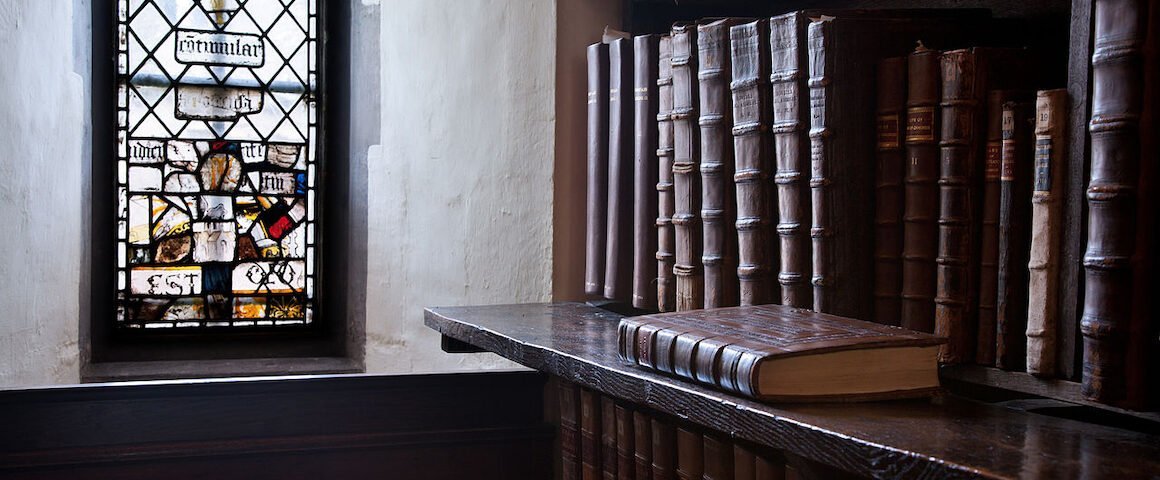The pernicious doctrine opposed by Article XVI—that deadly sins committed after baptism cannot be forgiven—is rarely encountered in our dissolute age. If anything, we are more likely to fall into the opposite error of diminishing the seriousness of sin and the damage it inflicts. Yet tender consciences, suffocating beneath the burden of grievous sins, are still common, and I can add nothing to Browne’s thorough demonstration that, as the Article teaches, “After we have received the Holy Ghost we may depart from grace given and fall into sin, and by the grace of God we may arise again and amend our lives.”
The phrasing of the Article—“not every deadly sin willingly committed after baptism is sin against the Holy Ghost, and unpardonable”—could be taken to mean that although not every deadly sin committed after baptism is sin against the Holy Ghost, some deadly sins committed after baptism do qualify as sin against the Holy Ghost. However, it is instructive to note that a number of older commentators have no qualms about equating the language of the Article, “not every deadly sin,” with the assertion that “every deadly sin, that is, every sin (for every sin is deadly) willingly committed after baptism, is not the sin against the Holy Ghost.”[1] The reasoning behind this interpretation is unfolded by Bishop Beveridge:
Every sin of a regenerated man cannot be the sin against the Holy Ghost, for that shall never be pardoned: and it shall therefore only never be pardoned by God, because never repented of by us. For if it could be repented of by us, it could not but be pardoned by God, the promise of pardon to repentance running in general terms, that if a man do confess his sins to God, God will pardon his sins to him; and therefore, though a regenerate man may fall into sin, yet seeing he may also afterwards rise from it, and repent of it, it may also be pardoned to him; and therefore it is not the sin against the Holy Ghost.[2]
It therefore seems advisable to follow these commentators’ lead and treat the Article’s phrasing as a syntactical quirk, rather than understanding it to mean that some post-baptismal deadly sins qualify as sin against the Holy Ghost.
If deadly sins in general are not the sin against the Holy Ghost, then the question of what precisely the sin against the Holy Ghost is naturally arises. Article XVI of the Forty-two Articles, “Blasphemy against the Holy Ghost,” answers this question as follows:
Blasphemy against the Holy Ghost is, when a man of malice and stubbornness of mind doth rail upon the truth of God’s word manifestly perceived, and being enemy thereunto, persecuteth the same. And because such be guilty of God’s curse, they entangle themselves with a most grievous and heinous crime, whereupon this kind of sin is called and affirmed of the Lord unpardonable.[3]
This was one of four Articles “dropped entirely” in the transition from forty-two to thirty-nine, “abandoned, it may be, from a reluctance to define the nature of the irremissible sin, or, as in other cases, from the partial disappearance of the sect at which it had been levelled.”[4] In light of the total lack of consensus on the nature of blasphemy against the Holy Ghost, we would do well to follow this precedent and be reluctant to pronounce definitively on the subject. What little I have to contribute, then, is in the way of observation and speculation rather than assured judgment.
Among Anglican commentators, two of the more popular positions are that 1) blasphemy against the Holy Ghost refers specifically to the attribution of Spirit-empowered miracles to the devil;[5] 2) blasphemy against the Holy Ghost refers more broadly to a state of final impenitence in which one dies. Browne, among others, holds the latter position:
This seems the true explanation of the sin against the Holy Ghost, namely, obstinate, resolute, and wilful impenitence, after all the means of grace and with all the strivings of the Spirit, under the Christian dispensation as distinguished from the Jewish, and amid all the blessings and privileges of the Church of Christ. And this view of the subject does not materially differ from the statement of St. Athanasius, namely, that blasphemy against Christ, when His manhood only was visible, was blasphemy against the Son of Man; but that, when His Godhead was manifested, it became blasphemy against the Holy Ghost: nor from that of St. Augustine, that the sin against the Spirit of God is a final and obdurate continuance in wickedness, despite of the calls of God to repentance, joined with a desperation of the mercy of God.[6]
Another possibility sometimes mentioned is that blasphemy against the Holy Ghost refers to apostasy,[7] though I have not encountered many scholars who affirm this theory.[8]
Given the uncertainty over how blasphemy against the Holy Ghost should be defined, it is not surprising that ordinary Christians throughout history have been gravely troubled by the possibility that they have committed this blasphemy, thereby rendering themselves unpardonable and hellbound.[9] Today, however, it is widely agreed that those who are afraid they have committed it should rest assured that they have not, with their very concern as proof. Thomas Waite puts it this way:
No sincere Christian…need perplex his mind with the apprehension of having committed the sin against the Holy Ghost; since it never can be committed by those, who believe Jesus Christ to be the Saviour of the world and acknowledge in his miracles the divine power, which the wicked Pharisees denied. Their very fear preserves them from the danger of falling into this unpardonable crime.[10]
Some commentators go further and maintain that Christians cannot commit blasphemy against the Holy Ghost. In the words of F. E. Middleton, “Let all rest assured that such a sin is impossible to the true believer.”[11] Whether or not this is so will depend on which definition of this blasphemy is adopted. For example, if we suppose, as many have, that it can only be committed when one is personally faced with divine miracles, then the possible scope for this blasphemy in the present day will be quite confined. In this vein, Bishop Burnet declares that “since miracles have ceased, no man is any more capable of this sin.”[12] Even if the contention that miracles have ceased altogether is debatable, opportunities to witness miracles today and thus be in a position to commit blasphemy against the Holy Ghost will be limited in any event. On the other hand, if we suppose that blasphemy against the Holy Ghost should be defined as final impenitence or apostasy, it is easy to affirm that people today can be guilty of both these things, but it then becomes difficult to say what about this blasphemy is unique or distinct, when it amounts to a synonym for terms with which we are already familiar.
In sum, regardless of how we define blasphemy against the Holy Ghost, we arrive at the unexpected conclusion that, as a category of behavior, this blasphemy does not appear to have much of a distinctive bearing on the present day. If it is defined in connection with the manifestation of divine miracles, then only a small number of people, at best, will even have occasion to commit this blasphemy. Alternatively, if it is defined in connection with final impenitence or apostasy, then it amounts to a more dramatic rendering of already established concepts. In a strange way, one can appreciate how it came to be that blasphemy against the Holy Ghost developed into an ever-looming abyss that one was at risk of falling into at any moment, almost unawares. When such a lurid conception is put to the side, the traditional speculations of more sober divines cause this blasphemy to recede almost into the background as an irrelevancy.
These idle musings should by no means be treated as the final word on the subject. Nonetheless, it seems to me that the more carefully and precisely blasphemy against the Holy Ghost is defined, the more difficult it becomes to show what practical relevance it has, as a category or term distinct from other already existing terms, for people today.
Notes
- William Beveridge, An Exposition of the Thirty-Nine Articles of the Church of England (London: James Duncan, 1830), 358. See also H. C. O’Donnoghue, A Familiar and Practical Exposition of the Thirty-Nine Articles of Religion (London: Taylor and Hessey, 1816), 123; Thomas Waite, Sermons, Explanatory and Practical, on the Thirty-Nine Articles (London: Baldwin, Cradock, and Joy, 1826), 247; Thomas Pigot, The Churchman’s Guide in Perilous Times (London: R. B. Seeley and W. Burnside, 1835), 44; and George Tomline, Elements of Christian Theology, 14th ed., vol. II (London: T. Cadell, 1843), 253. ↑
- Beveridge, Exposition, 360. ↑
- Quoted in T. P. Boultbee, An Exposition of the Thirty-Nine Articles (London: Longmans, Green, and Co., 1871), 136. ↑
- Charles Hardwick, A History of the Articles of Religion, 3rd ed. (London: George Bell & Sons, 1876), 129. See also Boultbee, Exposition, 136; Edgar C. S. Gibson, The Thirty-Nine Articles of the Church of England, 2nd ed. (London: Methuen and Co., 1898), 448; B. J. Kidd, The Thirty-Nine Articles: Their History and Explanation (London: Rivington’s, 1899), 149‒50; and E. Tyrrell Green, The Thirty-Nine Articles and the Age of the Reformation, 2nd ed. (London: Wells Gardner, Darton & Co., 1912), 106. ↑
- See Waite, Sermons, 246; Pigot, Churchman’s Guide, 45; Gilbert Burnet, An Exposition of the Thirty-Nine Articles, ed. James R. Page (New York: D. Appleton & Company, 1842), 188‒89; Tomline, Elements, 251; Daniel Waterland, The Works of the Rev. Daniel Waterland, 2nd ed., ed. William Van Mildert, vol. V (Oxford: Oxford University Press, 1843), 709, 712‒13; and Gibson, Thirty-Nine Articles, 447. ↑
- See also Boultbee, Exposition, 137, and Robert Louis Cloquet, An Exposition of the Thirty-Nine Articles (London: James Nisbet & Co., 1885), 325. ↑
- See Waterland, Works, 710, and Darrell L. Bock, Luke (Downers Grove, IL: InterVarsity Press, 1994), 223. ↑
- For one example, see Joel B. Green, The Gospel of Luke (Grand Rapids: Eerdmans, 1997), 484. ↑
- For an account of how the concept of blasphemy against the Holy Ghost developed into a lurking terror for ordinary Christians in the seventeenth-century Church of England, see Baird Tipson, “A Dark Side of Seventeenth-Century English Protestantism: The Sin against the Holy Spirit,” Harvard Theological Review 77, no. 3 (Jul. ‒ Oct., 1984): 301‒330, https://www.jstor.org/stable/1509463. ↑
- Waite, Sermons, 250. See also Craig L. Blomberg, Matthew (Nashville: Broadman Press, 1992), 204; Donald A. Hagner, Matthew 1‒13 (Dallas: Word Books, 1993), 348; Douglas R. A Hare, Matthew (Louisville: Westminster John Knox Press, 1993), 140‒41; Craig S. Keener, Matthew (Downers Grove, IL: InterVarsity Press, 1997), 232; James R. Edwards, The Gospel according to Mark (Grand Rapids: Eerdmans, 2002), 124; F. Dale Bruner, Matthew: A Commentary, revised ed., vol. 1 (Grand Rapids: Eerdmans, 2004), 567; and Daniel L. Akin, Exalting Jesus in Mark (Nashville: B&H Publishing Group, 2014), 79. ↑
- F. E. Middleton, Lambeth and Trent: A Brief Explanation of the Thirty-Nine Articles (London: Chas. J. Thynne, 1900), 92. See also Michael J. Wilkins, Matthew (Grand Rapids: Zondervan, 2004), 449, and Akin, Mark, 79. ↑
- Burnet, Exposition, 189. Compare Waite, Sermons, 246, and Waterland, Works, 712‒13. ↑







'The Conundrum of Blasphemy against the Holy Ghost [Commentary on Browne: Article XVI (1)]' has no comments
Be the first to comment this post!